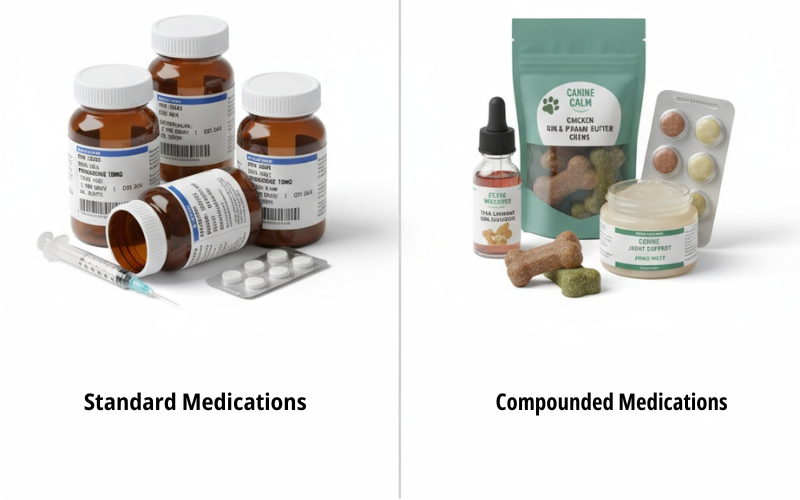If you have ever tried giving your pet a pill, you know it doesn’t always go as planned. Maybe your cat spits out the pill the second you turn away, or your dog needs a smaller dose than what’s available, or the drug doesn’t fit your pet’s needs.
That’s when veterinary compounded medications come in. Many pet owners aren’t familiar with what compounded medications are or how they differ from standard ones.
That’s why in this blog, we’ll break down the difference between them so that you can make more informed decisions about your pet’s treatment.
What are Veterinary Compounded Medications?
Veterinary compounded medications are custom-made drugs that are created by a licensed or professional pharmacist to meet the specific needs of the pet. These are prepared by mixing, altering, or combining ingredients from existing medications to create a drug that will suit the pet.
You can get these drugs easily at any pet medication compounding pharmacy or veterinary compounding in Jacksonville. These compounded medications are:
- Made by licensed pharmacists with a veterinarian’s prescription.
- Adjusted in form (liquid, chew, topical) or different flavor to suit your pet.
- Used when standard medications don’t offer the right dose, strength, or combination.
Why Might a Pet Need Compounded Medications?
Not every pet needs compounded medication, but for some, it can make a big difference. Veterinarians may recommend compounded medication to your pet in several situations:
- A commercial drug is unavailable in the correct strength or dose.
- The pet has allergies or sensitivities to an ingredient in the standard product.
- The medication needs to be reformulated, for example, changing a tablet into a flavored liquid or chewable form to make it easier to give.
What is the Difference Between Compounded Medication vs. Standard Medication?
While both medications are prescribed to treat the same health conditions, they differ in how they are made, approved, and prescribed. So, it might be better to know the differences between them, and it will help you to know why a veterinarian might choose one over the other:
| Aspect | Compounded Medication | Standard Medication |
| Preparation | Custom-made by a pharmacist for your pet based on a prescription. | Mass-produced by pharmaceutical companies for general use. |
| Availability | Only available through compounding pharmacies. | Widely available through regular pharmacies. |
| Consistency | May vary slightly because each batch is made individually. | Has uniform strength and formulation. |
| Approval | Not FDA-approved as a finished product but uses approved ingredients. | Fully FDA-approved for safety and quality. |
What Questions Should Pet Owners Ask About Their Pet’s Medication?
Before giving your pet a compounded drug, it’s always best to have an open conversation with your veterinarian. You can ask:
- Why is compounding the preferred option for my pet?
- Which pharmacy will prepare the medication, and are they licensed?
- How should I store and give this medicine?
- What side effects or reactions should I watch for?
- How long does the medication stay effective?
These questions will make sure that your pet’s medications are safe, effective, and properly handled from start to finish.
Conclusion
At the end of the day, every pet is different, and so are their healthcare needs. Standard medications are always the first choice when they meet your pet’s needs. However, if your pet needs a unique dose or form, compounded medications can be an excellent alternative.
If your vet recommends a compounded medication, it’s usually because it’s the safest and most effective way to help your pet get better. So, always follow your veterinarian’s advice and make sure to get medication from a reputable and licensed veterinary compounding pharmacy or veterinary pharmacy in Florida.
